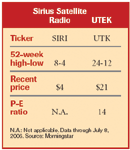Article
Stock Watch
Each month, we highlight two stocks selected as good bets by a premier analyst. The selections are based on several factors including growth potential, valuation, sector trends, competition, and dividends.
This month's guest analyst is Robert Flaherty, editor of Equities magazine and editor-in-chief of Equities Special Situations, an investment newsletter that's beaten the Wilshire 5000, a broad index of US stocks, for four consecutive years. The criterion for an "equities special situation" is a company whose projected price gain is 50 to 100 percent within two years.
Sirius Satellite Radio

However, Flaherty feels that costly contracts like Stern's, as well as other acquisitions, will bear fruit in the 2007 fiscal year. "Not only will estimated losses decline by about half," predicts Flaherty, "the tide will turn to reflect a positive cash flow." Analysts have projected that Sirius' revenues will exceed $1 billion next year (up from about $242 million in 2005), and its stock price will soar as a result.
The company boasts stellar leadership-CEO Mel Karmazin once headed CBS and co-ran Viacom-plus its steps toward contracting with more auto manufacturers for installation at the factory level will help grow market share. Given those two positives, Flaherty's confidence in Sirius' future is unflappable. "Buy it now when it's at a bargain-basement price," he advises.
UTEK
This Florida-based company acts as a go-between for small companies that need innovative technologies and the universities and research facilities that develop them. UTEK's unique "U2B" technology-transfer process helps companies identify and acquire technology in exchange for some of their equity, which helps these firms avoid risking their cash on research. As a result, UTEK owns stakes in some 50-odd companies. Some of its clients also rely on UTEK to license their existing proprietary technologies to other companies.
Since 1997, UTEK has signed agreements with 53 facilities and universities, including Johns Hopkins, Yale, and the California Institute of Technology. Its growth rate rose significantly last year-sales were up 216 percent-and it completed 14 transactions, up from 11 the previous year, giving UTEK's larger, wealthier competitors a run for their money. "Aside from the number of deals," Flaherty notes, "even more significantly, the average deal generated revenues of $1.3 million, up 179 percent from $466,000 in 2004." Another promising sign: A number of institutional investors have climbed on board in the past year, such as Janus and OppenheimerFunds, as well as many from Great Britain.





